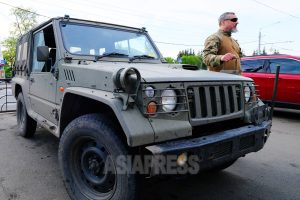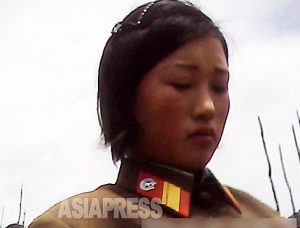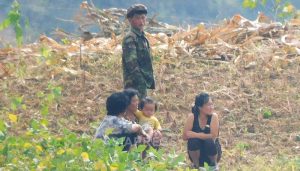ピナツボ山の噴火で故郷を追われたアエタ族を取材中、偶然、レイ・ベントゥーラは武装ゲリラの新人民軍(NPA)と遭遇した。
レイとゲリラたちの奇妙な交流を描いた小文。
レイはアジアプレス所属のフィリピン人ジャーナリスト。今回は原文の持ち味を活かすため、英語でそのまま掲載することにしました。
英文の軽妙なニュアンスをお楽しみください。
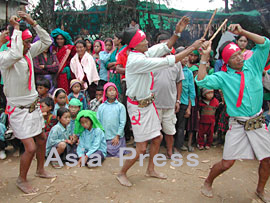 I was looking at the stars; I was trying to write a poem:
I was looking at the stars; I was trying to write a poem:
Sa likod ng kubo ni Mulawin
Ang mga bituin
Ay hagdang patungo sa langit
Na nagniningning.
Behind Mulawin's hut
The shining stars
are stairways to heaven.
It was a few days before the full moon and we had just taken our supper. We were seated on one end of Mulawin's cart, beside the hut. Mulawin was puffing a cigarette.
"It's a wonderful evening," he said, the glow of his Champion nearing the butt.
"Yes," I agreed. "Here, the sky is blue even at night."
The shadow of the banana tree played at our feet. Our heads were bent toward the sky.
"Can you photograph the stars?" he asked suddenly. "Ummm..." I said, searching for an answer. "Not this time. I need a special lens and film to take their picture."
"However," I reassured him, "I can take a video of the moon right now."
"That's nice," he smiled. "I want to see it."
I took the video camera from my bag.
I had spent the whole morning and afternoon filming Mulawin. I filmed him in the hills gathering cogon grass; I filmed him bathing his two kids in the stream; I filmed him cutting small trees. I've been filming him for over a year now. I first met him one Christmas in Manila; he and his family and other members of the Aeta tribe were begging on the streets.
I turned the camera on, zoomed in and focused on the moon above us. I asked him to look through the viewfinder.
"Oh," he exclaimed, "the moon has become bigger. I didn't know it could look this big in your camera. This camera is good; it is like color TV."
I pushed the red button and recorded the image. Later, I played it back for Mulawin and his two children. They were amused.
Not far from we were seated, to the west, is a tree called anonang. This tree, whose fruits when squeezed produce a sticky paste, is illuminated by hundreds of fireflies. It's like a huge Bavarian Christmas tree with tiny lights all over it. Looking at this tree, again, I try to write a poem. I recite it to Mulawin.
Sa dami ng mga nagniningning
Na nakapalibot kay Mulawin,
Hindi ko na alam kung alin
Ang aliptap at alin ang bituin.
With the abundance of objects shining
And hovering around Mulawin,
Which is star, which is firefly?
The distinction skips the eye.
He smiled.
"In Manila," I said, "the sky is dirty. You can never see the sky as bright as this."
"But your life there is better than ours. You have electricity, cars, big houses," he argued.
"That doesn't mean that our life is better than yours," I countered.
"This is an extraordinary night," I repeated, praising again the moon, the stars and the fireflies. "There is really no need for electricity here."
"That's what you say," he said, a bit cross, "because you lowlanders have the benefit of electricity. But with hill tribes like us, the government doesn't care."
"Did you ever notice the sky in Manila?" I asked, teasing him. "Did you ever see the moon there?"
"But you have no need for a moon in the city," he said. "You have lights 24 hours a day."
Mulawin is obsessed with electricity. One of the things he bought with the money he earned from begging was a 6-volt battery. He uses this battery to operate his electric fishing gear and to produce light at suppertime.
"Take a rest now," he said. "You have to wake up early." The only jeep going to town leaves at four in the morning.
It was cold and the mosquitoes were stubborn and unforgiving. I covered myself from head to foot: socks and hiking shoes, denim jeans, winter jacket, towel around my neck, and an Ifugao-made balaclava. Some mosquitoes still managed to evade these obstacles and tasted my blood.
The rays of the moon penetrated my balaclava. There was no enclosure around me except for the roof fashioned from banana leaves. Mulawin was snoring. I was tired and wanted to fall asleep at once, but I couldn't.
After a while, I hear a faint barking of dogs. It disappears and recurs. But every time it comes back, it becomes louder and closer. Somebody, I say to myself, must be walking in the night, basking in the glory of the full moon. I try to sleep again but the barking becomes louder and louder; nearer and nearer. By now, I have no doubt the dogs are barking at some people in motion. Who could they be? And where are they going? Maybe they are drunks on their way home?
The barking didn't stop. Instead, it grew louder and louder until the puppies beneath my feet came out and started to bark. I could hear voices, and grasses brushing passersby.
The puppies continued to bark until the steps and voices stopped near my feet. There was a brief moment of silence; I sensed a number of people around me.
"Tao po,"came the voice of a young man. "Magandang gabi po."
I pulled my balaclava up and rose. Still seated, I looked at the 'voice.' He was wearing a cap and was in fatigue uniform. I could see the muzzle of his rifle on his back. He came closer and took his cap off.
"I'm comrade John," he said, "We are members of the New People's Army."
"I'm Rey," I said.

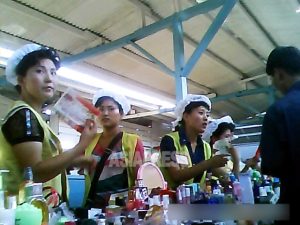

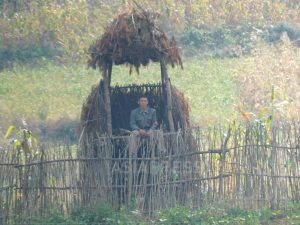
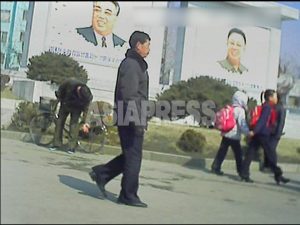
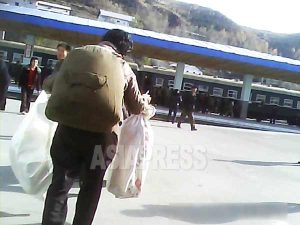

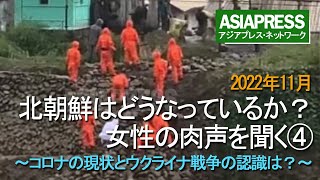

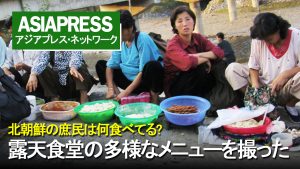
![<北朝鮮>[動画] 日韓で放映されたホームレス女性が死亡 <北朝鮮>[動画] 日韓で放映されたホームレス女性が死亡](https://www.asiapress.org/apn/wp-content/uploads/2010/12/201010070000000view.jpg)





